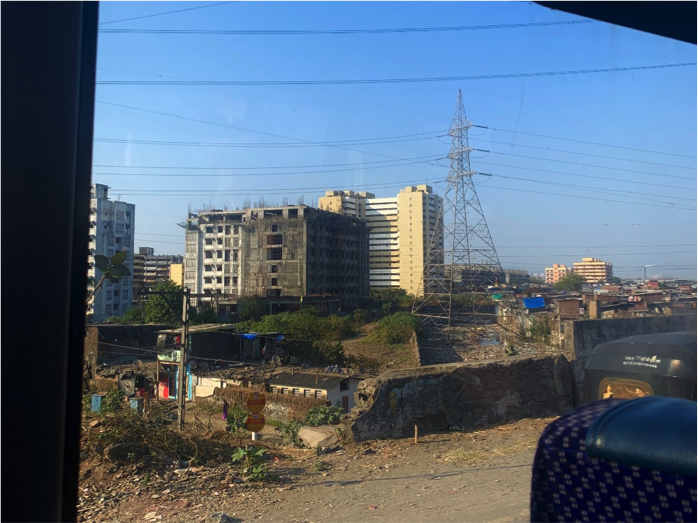By Dakshata Sharma
Bachelor of Liberal Arts & Science (majoring in Political Economy)
Having been in Mumbai for a few days now, there is no question that the glitz and glamour that we’ve heard about through the Bollywood industry and other forms of pop culture is prevalent in certain parts of this city. What isn’t so beautiful, glitzy or glamourous, is the inequality that is visible across this city.
Even on a bus, while travelling to a field trip, looking out of the window on the right, I see a business hub and high-rise buildings with men and women living their fast-paced life in the corporate and capital centric world. Glancing over to the left, the scenes of slums, self-built projects, temporary housing, mountains of waste and extreme poverty paint the horizon.

I think this stark contrast between the rich and the poor in Mumbai is an economically fascinating and unique place and for most visitors, they’ve never experienced this inequality before. There are diverse economic, social and political conditions within kilometres of each other. The social and geographical boundaries characterised by class, caste, gender and religion draw many lines and dissect this city.
Bearing witness to the spaces where inequality manifests as disadvantage is fascinating. But how ethical is it for tourists to go to slums?
Slum tourism is a commercial enterprise in Mumbai. A simple internet search or visit to a local tourism office will recommend slum tours as an attraction, but the question lies, should spaces where people live and work be commodified into a tourist attraction, where strangers come to (essentially) gawk at the residents of impoverished communities?
It seems wrong of tour companies to capitalise of someone’s poverty, and through constant advertising and promotion of slum visits and tours – poverty tourism has become normalised in Mumbai.
This is not to suggest that tourists visit slums with the malicious intent to disrespect residents; but if we try for a moment to think about poverty tourism from the point of view of the slum occupants, there are many questions we might raise about how the presence of tourists is experienced by slum residents.
Groups of people, mostly foreigners, with cameras, clean clothes, different languages, looking fascinated and pitiful at the same time may come across as being insensitive and intruding within their space. Although not trying to impose, and as I mentioned earlier, tourists generally visit these areas due to a sense of curiosity. But in visiting slums commercially, with a tour group, people do things like take photos without consent and post them on social media for public consumption. This may be experienced by slum residents as unwanted imposition.
On the other hand, it could be argued that poverty tourism contributes to the economic activity within the spaces of impoverished communities, and allows tourists a critical perspective to see a socially organised space which may sensitise them to the issue and help them to better understand the disparity within the Indian economy.
Debates about the ethical or non-ethical nature of slum tourism are ongoing. I think for these kinds of discussions to resolve, there needs the focus has to be on the impact that these visits have on the residents and how these interactions affect their daily lives.


I concur with Dakshata on the subject of ghetto / slum tourism, it is unethical, unacceptable and insult to the community and hinderance to sustainable development. On the contrary, scale of slum tourism industry promote disparities to fulfil their selfish interests.